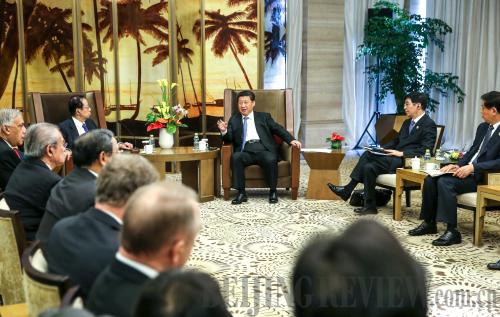|
 |
|
CHAIRING THE DISCUSSION: President Xi Jinping meets with members of the fourth Board of Directors of the Boao Forum for Asia in Boao, Hainan Province, on March 29 (MA ZHANCHENG) |
Visiting the tiny tropical island of Boao in south China's Hainan Province, it would be hard to imagine a more picturesque or conducive venue for large-scale gatherings. The island boasts an abundance of coconut trees and sunny beaches cooled by the area's customary gentle ocean breeze. The overall atmosphere is one of tranquility.
Against this enviable backdrop, an array of elites drawn from a wide spectrum of society both in China and abroad gathered from March 26 to 29 to pool their wisdom and share their insights on a broad range of topics during the annual Boao Forum for Asia (BFA). Numbered among them were over 2,000 political leaders, business tycoons and globally renowned academics.
Held under the theme of Asia's New Future: Towards a Community of Common Destiny, this year's forum distinguished itself from previous gatherings through the broader participation of political heavyweights from almost every continent, as represented by the presence of Chinese President Xi Jinping and state leaders from Malaysia, Armenia, Australia, Indonesia, Nepal, Russia, the Netherlands, Thailand, Kazakhstan, Austria and Sweden, among other nations, at the opening ceremony on March 28.
"The original goal of the Boao Forum when it was founded was to build a community of common destiny. I'm glad that we are coming to discussions surrounding this topic," said Yasuo Fukuda, Chairman of the Board of Directors of the BFA and former Prime Minister of Japan, during the opening ceremony.
"Our friends in Southeast Asia say that the lotus flowers grow taller as the water rises. Our friends in Africa say that if you want to go fast, walk alone; and if you want to go far, walk together. Our friends in Europe say that a single tree cannot block the chilly wind. And Chinese people say that when big rivers have water, the small ones are filled; and when small rivers have water, the big ones are filled," said Chinese President Xi in the opening speech addressing the importance of international cooperation in boosting common development and illustrating the idea of "a community of common destiny."
The more specific framework for building such a community in Asia, which was underscored by Xi, included the China-ASEAN community of common destiny and an East Asia economic community for ASEAN, China, Japan and the Republic of Korea (ROK). The East Asia economic community is scheduled for completion by 2020.
Bringing Asia closer
Furthering cooperation between China and ASEAN countries was accorded high importance during the forum. Chinese Foreign Minister Wang Yi vowed to press ahead with the upgrading of the China-ASEAN Free Trade Area (CAFTA) and the negotiations of the Regional Comprehensive Economic Partnership (RCEP)—a multilateral free trade area that will include China, the ROK, Japan and 10 members of the ASEAN as well as India, Australia and New Zealand.
He also promised to improve the level of economic and trade cooperation between China and ASEAN and realize a bilateral trade volume of $500 billion this year and $1 trillion by 2020. Finally, he called for enhancing interconnectivity between infrastructures and various industries, as well as putting the Asian Infrastructure Investment Bank into operation by the end of 2015.
"At present, the Chinese economy has entered the 'new normal.' ASEAN countries will be the top choice for China to export its high-quality excess capacities. We will explore the possibility of building more industrial parks with ASEAN countries to help upgrade local industries," Wang stated.
Over the past few decades, China's cooperation with ASEAN has strengthened. As one of the regional bloc's 10 dialogue partners, China together with ASEAN in 2002 forged the CAFTA, at present the largest free trade area among those made up of developing countries. China has been ASEAN's largest trading partner for five consecutive years and ASEAN has been China's third largest trading partner for four years. Over 1,000 flights fly back and forth between the two sides every week and personnel exchanges between the two are estimated to number 18 million every year.
The proposals put forward at this year's BFA were not without precedence. President Xi had proposed creating a closer community of common destiny and co-building the 21st-Century Maritime Silk Road with ASEAN during a visit to Indonesia in October 2013. Premier Li Keqiang first proposed the 2+7 Cooperation Framework (referencing two political consensuses and seven areas of cooperation) while attending the 16th China-ASEAN Leaders' Meeting held in Brunei in 2013.
Aside from economic cooperation, Wang said the two parties will also up cooperation in the areas of education, culture, tourism, sports and medical care, as well as fostering and facilitating exchanges between young people, the media, think tanks and local governments.
ASEAN representatives also expressed willingness to further interact with China during the forum. "We are members of ASEAN. It doesn't mean we'll forget China. China is with us, South Korea is with us, Japan is with us. So we have the ASEAN+3. This is one group and it is going to be a very important group," said former Malaysian Prime Minister Datuk Abdullah Haji Ahmad Badawi.
"During the 1997 financial crisis, the IMF and other like organizations did not really pay attention to our crisis; by the way, China had taken very good actions and supported us. So next is to reduce the gap between us and second to have some common vision in terms of security, regional connectivity, cooperation with neighbors," he added.
| 